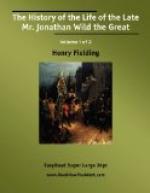Thus did our young hero not only lend his rhetoric, which few people care to do without a fee, but his money too (a sum which many a good man would have made fifty excuses before he would have parted with), to his friend, and procured him his liberty.
But it would be highly derogatory from the great character of Wild, should the reader imagine he lent such a sum to a friend without the least view of serving himself. As, therefore, the reader may easily account for it in a manner more advantageous to our hero’s reputation, by concluding that he had some interested view in the count’s enlargement, we hope he will judge with charity, especially as the sequel makes it not only reasonable but necessary to suppose he had some such view.
A long intimacy and friendship subsisted between the count and Mr. Wild, who, being by the advice of the count dressed in good cloaths, was by him introduced into the best company. They constantly frequented the assemblies, auctions, gaming-tables, and play-houses; at which last they saw two acts every night, and then retired without paying—this being, it seems, an immemorial privilege which the beaus of the town prescribe for themselves. This, however, did not suit Wild’s temper, who called it a cheat, and objected against it as requiring no dexterity, but what every blockhead might put in execution. He said it was a custom very much savouring of the sneaking-budge, [Footnote: Shoplifting] but neither so honourable nor so ingenious.
Wild now made a considerable figure, and passed for a gentleman of great fortune in the funds. Women of quality treated him with great familiarity, young ladies began to spread their charms for him, when an accident happened that put a stop to his continuance in a way of life too insipid and inactive to afford employment for those great talents which were designed to make a much more considerable figure in the world than attends the character of a beau or a pretty gentleman.
CHAPTER SEVEN
Master wild sets out on his travels, and returns home again. A very short chapter, containing infinitely more time and less matter than any other in the whole story.
We are sorry we cannot indulge our reader’s curiosity with a full and perfect account of this accident; but as there are such various accounts, one of which only can be true, and possibly and indeed probably none; instead of following the general method of historians, who in such cases set down the various reports, and leave to your own conjecture which you will chuse, we shall pass them all over.




